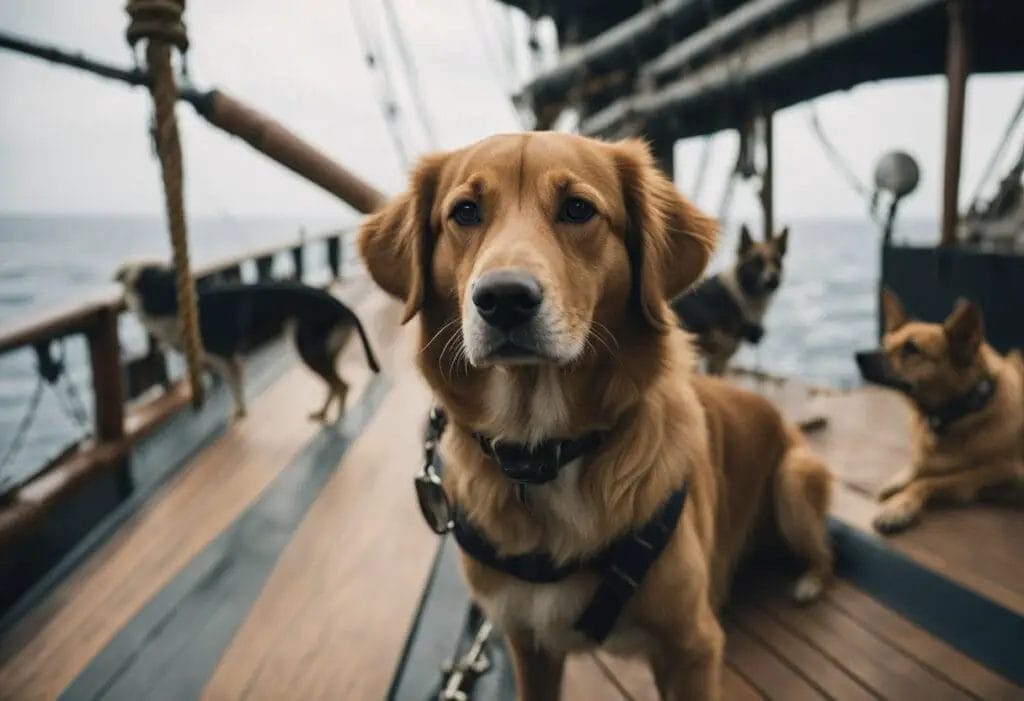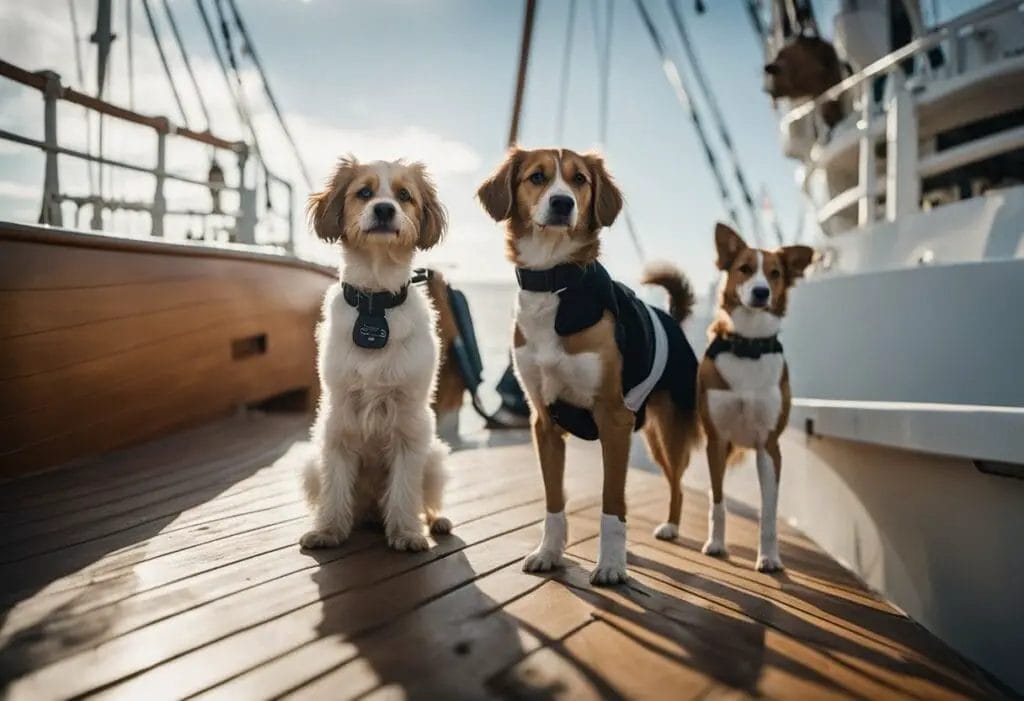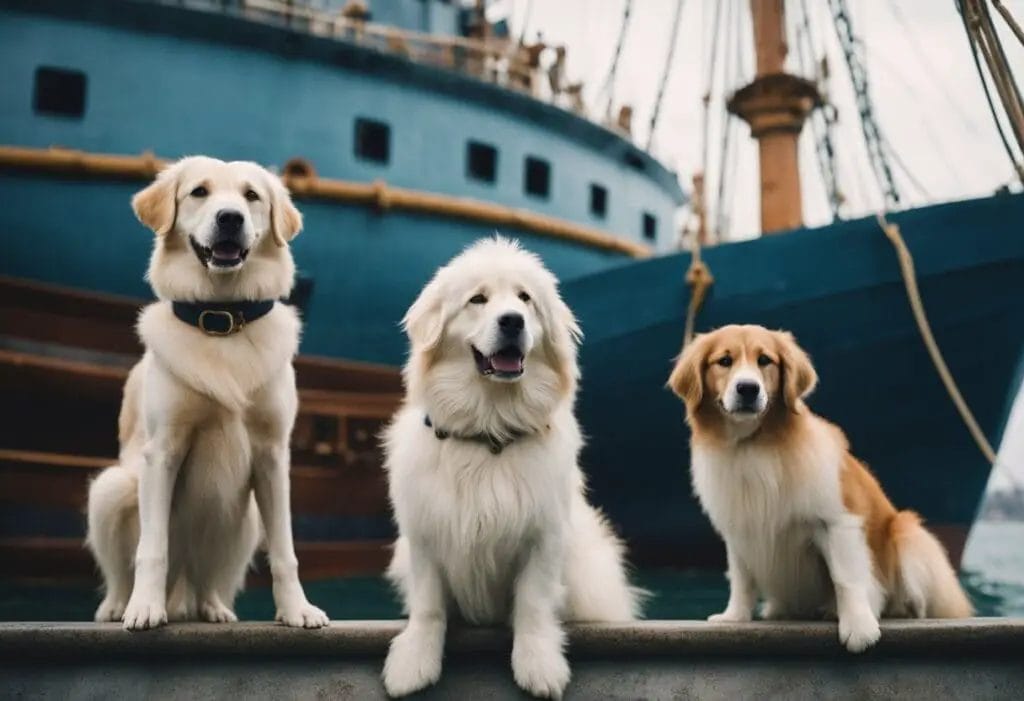As an animal lover and history enthusiast, I’ve always been fascinated by the role of dogs in ancient civilizations. From hunting companions to loyal protectors, these furry creatures have played an important part in human history. But did you know that dogs also played a crucial role in ancient maritime explorations?

As early as 3000 BCE, dogs were already being used as seafaring companions by the ancient Egyptians. These dogs were trained to hunt fish and birds, and their keen sense of smell was invaluable in detecting land and other ships. As maritime exploration continued to evolve, so did the role of dogs on board.
In fact, dogs were so important to seafaring that they even had their own special accommodations on board. Some ships had kennels built specifically to house the dogs, while others allowed them to roam freely on deck. It’s clear that dogs were not just pets on board, but rather valuable members of the crew. So, what made them such essential companions on these voyages?
Domestication and Evolution of Dogs
As I explore the role of dogs in ancient maritime explorations, it is important to understand the domestication and evolution of these animals. Modern dogs are descended from a wolf species that went extinct around 15,000 years ago.
While there is little question that wolves were the ancestors of the domestic dog, the role that early hominid socialization and proximity to ancestral wolves played in dog domestication raises a number of important questions.
Origins and Early History
The domestication of dogs is believed to have started around 15,000 years ago when humans began to tame wolves for use in hunting and as companions. Over time, these wolves evolved into the modern dogs we know today. The process of domestication involved selecting for certain traits, such as docility and a willingness to work with humans, while breeding out others, such as aggression and a tendency to roam.
Genetic Traces and Interbreeding
Recent studies of ancient DNA and mitochondrial genomes have shed new light on the evolution of dogs. Researchers have found evidence of interbreeding between early dogs and wolves, as well as with other dog-like animals such as coyotes and jackals. This interbreeding has left genetic traces in the genomes of modern dogs, which still carry genes from their wolf ancestors.
Dogs in Ancient Cultures
It is also important to understand the significance of dogs in ancient cultures. Dogs have been a part of human history for over 18,000 years and have played various roles in different cultures.
Roles and Significance
Dogs were used for hunting, guarding, and companionship in many ancient cultures. In war, dogs were used as sentries, scouts, and even as weapons. The Romans, for example, used large, fierce dogs called mastiffs to attack their enemies. In Europe, dogs were used to hunt game, and protect livestock. In the Near East and Middle East, dogs were used for hunting, guarding, and as companions.
Burial and Symbolism
Dogs were often buried with their owners in ancient cultures, a sign of their importance and companionship. In Egypt, dogs were associated with the god Anubis, who was often depicted with the head of a dog. Dogs were also important in Roman mythology, where they were associated with the goddess Diana and were believed to have the power to see ghosts.
Archaeological evidence has revealed that dogs were also important in Bronze Age cultures in East Asia and New Zealand. At the University of Oxford, researchers have found that dogs were bred for specific purposes in ancient cultures, such as hunting and herding.
Dogs in Maritime Explorations

Dogs have been an integral part of maritime exploration for centuries. They were used for various purposes, including hunting, guarding, and companionship. As a natural history enthusiast, I have always been fascinated by the role of dogs in ancient maritime explorations.
During the Age of Discovery, dogs were commonly used on ships to hunt for food and protect the crew from wild animals. These dogs were specially trained to hunt for birds, fish, and even whales. The Portuguese explorers were known to use large dogs, such as the mastiff, for hunting and guarding their ships.
Apart from hunting, dogs were also used to help sailors navigate their way through unfamiliar waters. The dogs would often be sent ashore to explore the land and bring back valuable information to the crew. This was particularly useful in areas where the terrain was difficult to navigate.
One of the most famous dogs in maritime history was a Newfoundland named Seaman. Seaman was the dog that accompanied Lewis and Clark on their expedition to explore the western part of the United States. Seaman was known for his bravery and loyalty, and he played a vital role in the success of the expedition.
Impact of Dogs on Human Societies

Hunting and Herding
As a domesticated animal, dogs have played an important role in human societies throughout history. In ancient times, dogs were used for hunting and herding. They helped humans to catch prey and protect livestock. They were also used to pull carts and plows, which helped to increase agricultural productivity.
In terms of maritime exploration, dogs were often brought on board ships to help with hunting and fishing. They were also used to guard the ship and protect the crew from danger. Their keen sense of smell and hearing made them valuable assets in detecting land and other ships.
Emotional and Social Impact
Dogs have also had a significant emotional and social impact on human societies. They have been loyal companions to humans for thousands of years, providing comfort, protection, and companionship. They have been known to improve mental health and reduce stress levels.
In ancient times, dogs were often seen as symbols of power and status. They were also used in religious ceremonies and believed to have supernatural powers. For example, in ancient Egypt, dogs were associated with the god Anubis, who was believed to protect the dead.
Overall, the impact of dogs on human societies has been significant and enduring. They have played important roles in agriculture, hunting, and maritime exploration, as well as providing emotional and social support to their human companions.
